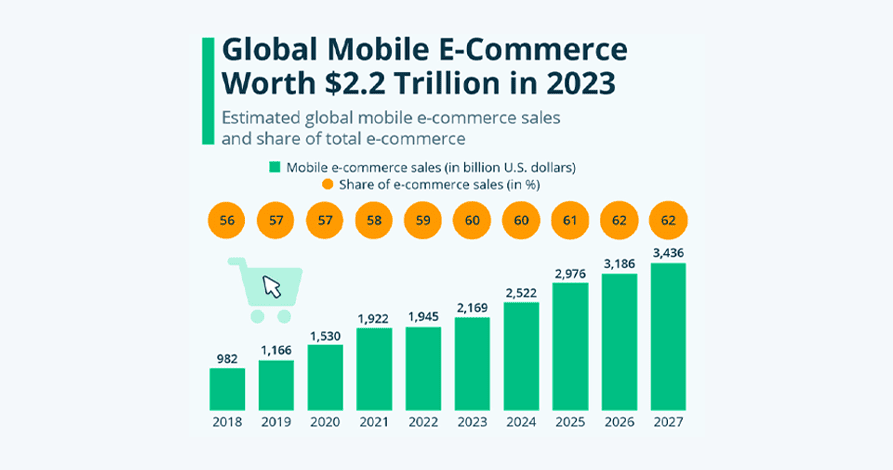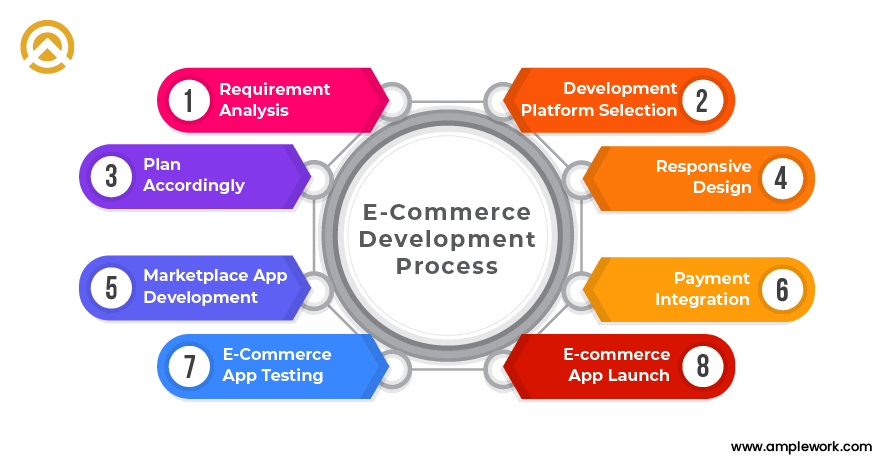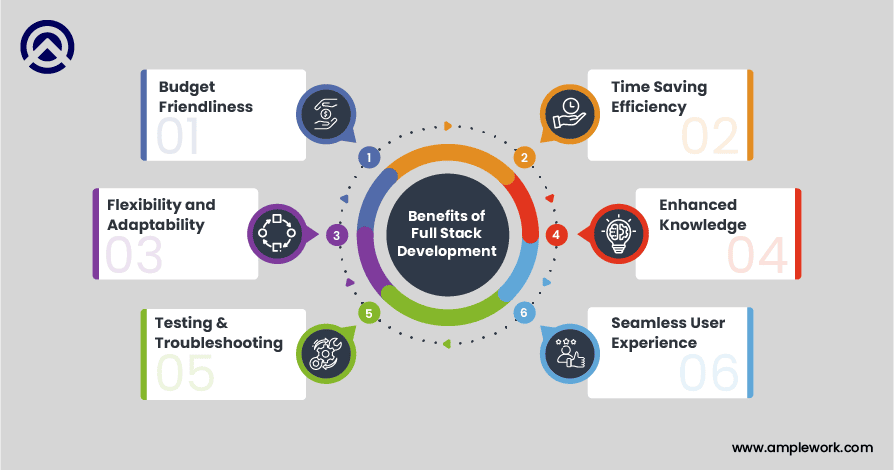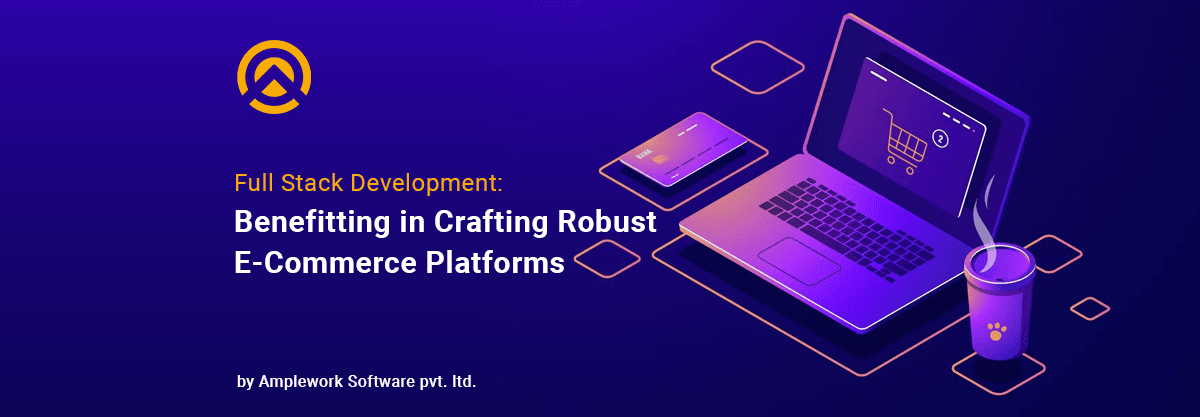In the current scenario, digitalization can be seen everywhere. Due to the continuous advancements in the technology. This digitalization is opening up a wide range of new opportunities for individuals. Making their daily chores much easier and time-saving. Imagine the earlier times when you had to purchase every product and service by visiting the marketplace. Which also doesn’t share a wide range of choices with you for selection. This digitalization has brought the market into people’s hands. In the form of online shopping platforms, where one just needs to search for their desired amongst a wide range of available choices of products and simply buy the same with a single tap on their mobile screens. That’s the reason behind the success of the e-commerce platforms with full-stack development that hinges on their ability to deliver users with a seamless, secure, and user-friendly shopping experience.
According to recent research performed by a well-renowned platform, Forbes the growth in retail E-Commerce Sales globally is expected to be approximately $8148 trillion. In the current year that is 2023, it was recorded that around $6130 trillion in Full Stack app development services play an essential role in digitalization of the businesses, by addressing some crucial aspects like shopping cart integration, secure payment processing, and an intuitive interface design for individuals. In this blog, we will be going to discuss the role of full-stack development services in crafting robust E-commerce platforms for businesses.
Statistical References About the E-commerce Solutions
The research and statistical consideration derived from the data insights of a well-known research platform that is “Statista” clearly indicates the estimated global mobile e-commerce sales that are expected to reach approximately 3,436 billion USD by the year 2027. The same was recorded with over 2.2 trillion USD in the current year which is 2023. Since the market of e-commerce is gradually increasing, especially after the pandemic. As consumers have started spending more and more on online shopping mobile apps that are easy to use and offer a great shopping experience to them. This also resulted in the growth of e-commerce mobile app development companies offering the best full-stack development services in the past few years.
 Source: Statista
Source: Statista
Building a fully functional, feature-rich e-commerce platform requires a series of steps. These step. E-commerce development is not only limited to creating an attractive and intuitive front-end but also requires a secure and reliable backend for data operations like storage and maintenance. Here is a series of steps that you need to follow for robust e-commerce marketplace development.
 E-commerce Development Process
E-commerce Development Process
1. Requirement Analysis:
The essential aspect of crafting a robust e-commerce platform is analyzing and defining the business requirements. You should clearly outline the requirements for analyzing the future goals of your business. The requirement analysis includes the user’s roles, features, and functionalities that you want in e-commerce solutions, etc. Also, you need to identify your targeted audiences and mechanisms like payment processing, order management, and inventory tracking before choosing e-commerce app development services.
The next phase is when you need to select the right development platform and technology. Select a suitable tech stack for both the front-end and back-end development. For the front end, the popular choices of the platform include React, Angular or Vue.JS, etc. Coming to the backend the most popular choice are Node.JS, Django, Ruby on Rails, or Laravel. Finally, for the database, you can go with MySQL or MongoDB.
3. Plan Accordingly:
The next phase is to plan the complete schedule of online shopping mobile application development. The more efficient the plan is the highly robust solution can be created for the businesses. You should process the planning considering all the requirements of users, resources to be used, and the client’s future goals.
4. Responsive Design:
Creating an intuitive user interface that is easy to use and navigate for the users, can drive the growth of your e-commerce business. This responsive design offers easy accessibility to the users across a wide range of devices that also a different screen sizes. Implement a secure user experience with an intuitive and responsive mobile app design for the e-commerce platform, ensuring the consistency of usage experience whether it can be on a mobile device or a tablet.
5. E-commerce Marketplace Development:
Next, you have to start with the coding for your chosen platform for both the backend and frontend. To build a robust, feature-rich, and user-centric marketplace mobile app development. For the same, you need to hire full-stack developers who are capable enough to create both the front and back end of the online shopping mobile app. Integrating the same with a secure database management system for efficient handling and management of user’s data. This stage consists of a wide range of activities that are as follows:
Backend Development
- Data Collection & Storage
- User Management
- Establishing Server Side Connectivity
- Integration of Previous Data
- Data Operations
Frontend Development
- Frontend code
- Wireframing
- User Interface Creation
- UI Designing
- Caching
For processing the e-commerce marketplace app development you should ask your hired e-commerce mobile app developers. To integrate your e-commerce solutions with a separate shopping cart where users can add their desired products to purchase them. Also, the next thing that you need to integrate is a secure payment gateway for completing the purchases by processing online payments.
7. Testing:
After you have completed the coding and created a full-fledged marketplace app the next thing you have to do is perform the comprehensive tests on the same. These testing mechanisms enable error, bug, and issue detection. After these errors and bugs are detected you need to remove them from the app. Also, you can launch a minimal version of the app for error detection from the user’s side. There you will get a clear understanding of the same.
8. E-commerce App Launch:
After the mobile applications are tested and optimized. You can proceed further with the launching process for the same. The launch process involves the implementation of the e-commerce solution to the business’s existing IT infrastructure. Choosing full-stack developers for the same can be a game changer.
Read more: 11 Things to Know Before Hiring Full-Stack Developers in 2023
Advantages of Full Stack Development For E-commerce Solution Development
 Benefits of full stack development
Benefits of full stack development
1. Budget Friendliness:
When you hire a full-stack developer to craft an e-commerce mobile app development solution. It gradually doesn’t let you rely on multiple developers for crafting both the front & back end of the mobile app. Instead, a single developer can handle both tasks back to back leading to an increase in the efficiency of development, rapid development, and reducing the cost factor automatically. That’s how it is considered a budget-friendly process for businesses.
2. Time Saver:
When you hire a separate developer for both the front and back end, there are higher chances of getting stuck between both of them resulting in the consumption of a lot of time for the businesses. Whereas when you hire a dedicated full-stack developer the need to craft an e-commerce mobile application can be handled by a particular developer. Resulting in rapid development which saves a lot of time for businesses.
3. Flexibility and Adaptability:
When you choose for full-stack development service or hire a full-stack web developer, you can understand that they are highly adaptable and can seamlessly perform multiple tasks at the same time without any failure. This flexibility leads them to adopt multiple changes to the project requirements and craft feature-rich solutions that best fit the business needs. It makes them implement changes to the project rapidly without any delays.
4. Enhanced Understandability:
It is a fact that full-stack e-commerce mobile app developers have a complete understanding of the entire development procedure. Their holistic development approach enables them to collaborate with the team more efficiently. Also, they can communicate the idea and project’s functionalities to the stakeholders without any hassles. This can reduce misunderstandings and enhance the development procedure for the businesses.
5. Easier Testing & Troubleshooting:
Full-stack developers are the sole creators of both ends of any online shopping mobile application. Having a comprehensive knowledge of the code that they have written for the same. This makes it easier for them to identify the bugs and issues during the testing phase of the mobile app. Also, they can troubleshoot or remove such errors or bugs more conveniently, ensuring the smooth functioning of the e-commerce application, that they have crafted.
6. Seamless User Experience:
Full-stack e-commerce mobile app developers play a major role in creating an intuitive design for the user interfaces that are easy to navigate for the users. Enhancing the overall shopping experience for them. Since they are knowledgeable enough in front-end technologies like HTML, CSS, and Javascript to create intuitive interfaces for seamless shopping experience for their users.
Final Words
Concluding about how Full-Stack development is the best approach for creating a feature-oriented e-commerce solution. Within the landscape of E-commerce industry the full-stack development plays an important role. Addressing the shopping cart integration to add up a secure and robust payment gateway with a fully user-friendly, intuitive design. Full stack development ensures a comprehensive and resilient e-commerce mobile app development without emptying your pockets by hiring different developers for the same.
Amplework Software, a highly recognized full-stack development company, offers you a robust and top-notch e-commerce platform for businesses. Catering all their specific requirements. With ample experience, we have served a wide range of clients that are startups or established businesses with our intuitive designing, Full-stack development services, and deployment skillset. Our team of expert e-commerce mobile app developers is versed in the latest technological advancements and different development methodologies, delivering you with high-performance solutions at an economical price range.
FAQ’s
Full-stack development involves the complete expertise of a services provider in creating both the front and back end of the mobile application. It ensures comprehensive development ensuring the integration of robust features like intuitive UI development, database management, and 3rd party integration services for enhancing the performance of mobile apps.
A responsive and reflexive user interface design ensures that the users can easily navigate through the E-com mobile app searching for their desired products and services without any hassles. A user-friendly interface completely minimizes user frustration levels and drives easier accessibility for them.
3. How Much Does Full Stack E-Commerce Development Services Costs?
A full-stack mobile app development costs you according to the features and functionalities that you require. However, we are providing you with a basic idea about the cost. The basic e-commerce platform will cost you approximately $20,000 to $25000 in the USA. Coming on the mid-range mobile apps that will be costing you around $35,000 to $40,000. Lastly, the cost of creating a feature-rich and advanced e-commerce app will cost you approximately $45,000 to $60,000.
Here’s the list of platforms that allow you to create robust e-commerce platforms with integrated features and functionalities:
- For Front-end Development: You can choose platforms like React, Angular, or Vue.js.
- For Back-end Development: You can go with Node.js, Django, Ruby on Rails, or Laravel.
- Database Management: Choose platforms like PostgreSQL, MySQL, or MongoDB.
- Payment Gateway Integration: You can opt the payment gateway services like Stripe, PayPal, or other reliable and secure options.










